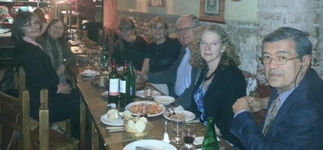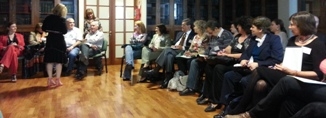 By Alvaro Puga, Ofelia A. Olivero, and Marta A. Carballo
By Alvaro Puga, Ofelia A. Olivero, and Marta A. Carballo
In recent years, it has been a mandate from SOT Council and a continued key mission of the Society to increase the efforts to establish strong global ties with its world-wide counterparts. Through conversations with the Special Interest Group (SIG) Hispanic Organization of Toxicologists (HOT) dating back to the 2010 SOT Annual Meeting in Salt Lake City, it was agreed that an outreach program where SOT scientists would participate as speakers at regional toxicology meetings in developing countries would be a good place to start. Several regional Toxicology societies in Spanish-speaking countries were contacted by HOT members and the Argentinian Toxicology Association (ATA) was the first to invite a group of SOT scholars, including Ofelia A. Olivero, Braulio D. Jiménez-Vélez, Julio C. Dávila, José E. Manautou, and Alvaro Puga, to present their research at its annual 2010 meeting. Last October, with the invitation of the President of the Argentine Toxicology Association (ATA), Marta A. Carballo, and the support from the Global Strategy Task Force and the SOT Council Subcommittee for Non-SOT Meeting, Component, and Global Funding, Ofelia A. Olivero and Alvaro Puga returned to Buenos Aires to attend the XXX Jornadas Argentinas Disciplinarias de Toxicología, dedicated to the 50th anniversary of the creation of the first hospital unit on Clinical Toxicology in Argentina. For this opportunity ATA supported the lodging of the SOT scholars, as well as others invited speakers as Graciela Spivak and Phil Hanawalt from Stanford University, María Eugenia Gonsebatt from UNAM (México), and Julie Dutil from the Ponce School of Medicine (Puerto Rico). For additional information about SOT Global Initiative Funding, visit the SOT website.
 The meeting program included several Symposia, with presentations on Ecotoxicology, Radiotoxicological Protection, Clinical and Legal Toxicology and Environmental Catastrophes. Dr. Puga opened the program with the Keynote presentation discussing the current understanding of arsenic methylation and its role in epigenetics. An international panel of presenters on Cellular Responses to Genetic Damage included Dr. Olivero, who described her current work on DNA repair of damage caused by anti-AIDS drugs. She also chaired and conducted a workshop on Peer Instruction and Mentoring that attracted a large number of attendants. Considering the successful results, Dr. Carballo is planning for the next year to develop a full-day workshop on this subject for the School of Pharmacy and Biochemistry, the University of Buenos Aires.
The meeting program included several Symposia, with presentations on Ecotoxicology, Radiotoxicological Protection, Clinical and Legal Toxicology and Environmental Catastrophes. Dr. Puga opened the program with the Keynote presentation discussing the current understanding of arsenic methylation and its role in epigenetics. An international panel of presenters on Cellular Responses to Genetic Damage included Dr. Olivero, who described her current work on DNA repair of damage caused by anti-AIDS drugs. She also chaired and conducted a workshop on Peer Instruction and Mentoring that attracted a large number of attendants. Considering the successful results, Dr. Carballo is planning for the next year to develop a full-day workshop on this subject for the School of Pharmacy and Biochemistry, the University of Buenos Aires.
There was ample opportunity to network with the more than 300 scientists that attended the meeting, not just from Argentina, but also from neighboring countries, such as Chile, Paraguay, Uruguay, and Brazil and to talk about participation in SOT, the SOT Annual Meeting, and the benefit of SOT membership. The recently formed Chilean Society of Toxicology was represented by Lucía del Carmen Molina Lagos who was invited to join HOT.
It is expected that contacts such as this will lead to long-lasting relationships with toxicology scientists in other countries.The ATA is confident that SOT will have a presence at the next XVIII Argentinian Congress of Toxicology that will take place in Buenos Aires in September of 2013.